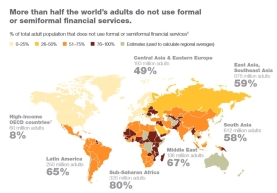financial inclusion
PH banks missing out on revenue from growing middle class market
Over 7 in 10 loans made by banks are extended to corporates– leaving 15 million SMEs and self-employed workers with little access to traditional finance.
PH banks missing out on revenue from growing middle class market
Over 7 in 10 loans made by banks are extended to corporates– leaving 15 million SMEs and self-employed workers with little access to traditional finance.
How Banks Can Accelerate Financial Inclusion in Southeast Asia
Thanks to the pandemic, the uncertainty of the world economy has been especially devastating for those living on the poverty threshold and struggling to make ends meet. Many in this demographic lost much-needed jobs as the economy shrunk, while others hustled on the side, for example, as food sellers, to continue to put bread on the table.
Journey towards financial inclusion in Bangladesh
Bangladesh has established its position as a pioneering country to have made significant strides towards financial inclusion and its vision ‘Digital Bangladesh’. The country’s recent development in its financial sector, varied heritage in credit and microfinance, widespread adoption of digital finance and mobile financial services (MFS) are recognized at a global level. The government’s effort to consider financial services as drivers of shared prosperity and inclusive growth. Access to financial services and their usage have significantly positive impacts on the socioeconomic outcomes that are perceived by businesses and households. Moreover, this access and usage are considered as essential factors to poverty eradication.
Significant gaps remain in financial accessibility, awareness: study
Over half of both unbanked and banked individuals feel that they are underserved, Mambu’s study found.



 Advertise
Advertise


















